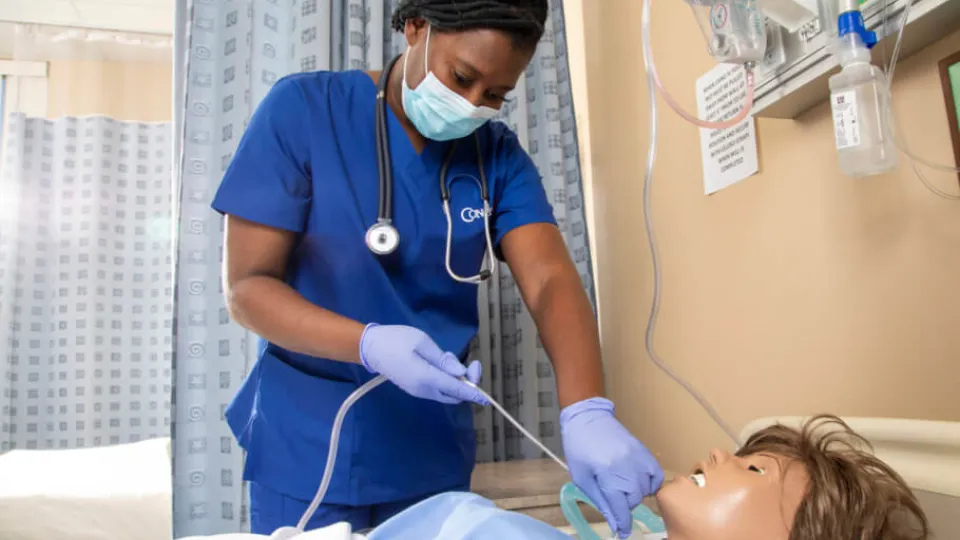
An RN to BSN program is designed for registered nurses who hold an active, unencumbered license and who have already earned an associate degree and wish to further their education by obtaining a Bachelor of Science in Nursing. This advancement is necessary in modern healthcare, as research shows that nurses with a BSN help improve patient care and outcomes.
The Institute of Medicine recommended that 80% of the nursing workforce hold a BSN by 2020, and as of 2022, 71.7% of RNs have achieved this milestone. BSN programs provide nurses with enhanced skills in leadership, research, and critical thinking, making them valuable assets in the ever-evolving healthcare field. So, what is an RN to BSN program, and what does it involve? This guide explores the progression in detail, including the benefits, admission requirements, curriculum, and career outlook.
What Is a BSN?

A BSN is a bachelor's degree that offers comprehensive nursing education beyond what's typically covered in an Associate Degree or Nursing Diploma program. The BSN curriculum includes advanced coursework in areas such as leadership, research, and community health. It equips nurses with improved critical thinking and leadership skills.
The degree prepares nurses for more specialized roles and can improve job prospects. In fact, 84% of surveyed BSN graduates received job offers at graduation, and 96% of respondents secured employment within four to six months. A BSN is an essential next step for nurses looking to advance their careers and take on greater responsibilities in the healthcare system.
Related: 8 NCLEX Tips for Passing the Exam and Understanding Test Requirements
Benefits of Pursuing an RN to BSN Program
Obtaining a BSN comes with many benefits for both the nurse and the patients they care for. These include:
- Improved patient outcomes: Increasing the number of BSN-trained nurses by 10% can lead to a 24% greater survival rate for in-hospital patients with cardiac arrest.
- Job market demand: Approximately 70% of employers prefer to hire BSN-trained nurses, and 25% of hospitals now require a BSN for new hires.
- Expanded career opportunities: A BSN can open doors to specialized roles such as nurse managers, educators, and public health nurses.
- Greater professional development: Nurses with a BSN can have more opportunities to advance into leadership and teaching positions.
RN to BSN Program Structure

RN to BSN programs are designed to be flexible and accessible so it's easier for working nurses to continue their education. A full-time student can complete an RN to BSN program in as little as 15 months, with typical programs offering 30-31 credits for nursing courses. Many programs are available in a variety of formats, including fully online, a mix of online and in-person (hybrid), and both synchronous (live classes) and asynchronous (recorded lessons) options. These flexible structures make it possible for nurses to balance working and studying.
Related: Concorde RN-BSN Catalog
Admission Requirements
To enroll in an RN to BSN program, applicants generally need to meet the following requirements:
- Associate Degree or Nursing Diploma: Most RN to BSN programs require an associate degree in nursing from an accredited institution.
- Completion of basic courses: Most programs require students to have completed relevant foundation courses, such as anatomy, chemistry, microbiology, psychology, sociology, and statistics.
- A current RN license: An RN to BSN program will likely require an active RN license. Some programs require students to work up to 30 hours per week.
- Educational requirements: Most institutions require a 2.0 minimum GPA, ideally higher (varies by program), and a minimum grade of C or higher in all required courses.
- Letters of recommendation: A resume and letters of recommendation provide evidence of your work experience and ethics as a nurse. Make sure these documents showcase the parts of your experience that align most with the strengths of the institution you're applying for.
- Official transcripts: Some programs may require prospective students to provide official transcripts and/or a breakdown of training hours from their previous nursing education.
- A personal statement or essay: Some programs require students to complete an interview or provide a personal statement during the admission process. This may help the institution understand the student's background and motivation for enrolling in an RN to BSN program.
- A satisfactory background check: Nearly all institutions will require a recent background check before granting admission.
Curriculum Overview
RN to BSN programs cover a range of courses designed to enhance nursing knowledge and leadership skills. The following courses provide a well-rounded education, preparing nurses for advanced roles in clinical and community settings. Here's why each course is important:
- Concepts of professional nursing: This course introduces ethical, legal, and professional responsibilities, creating a foundation for safe, effective nursing practice.
- Nursing theory and research: This course teaches evidence-based practices, essential for improving patient care and building nursing knowledge.
- Leadership and management: This course prepares nurses for leadership roles, focusing on team coordination and decision-making in a healthcare setting.
- Community and public health nursing: This course focuses on promoting health and preventing disease within communities, which is key to addressing public health needs.
- Nursing research and evidence-based practice: This course encourages nurses to apply research in clinical settings, which may lead to better patient outcomes through informed care.
- Health assessment: This course develops advanced skills in patient evaluation, which is essential for accurate diagnosis and treatment planning.
- Health tech and informatics: This course covers the use of healthcare technologies to improve efficiency and accuracy in patient care and recordkeeping.
- Transcultural nursing and ethics: This course focuses on culturally competent care and ethical decision-making, which is vital for addressing diverse patient populations.
- Care for older adults: This course prepares nurses to manage the unique healthcare needs of aging populations, which is a growing area of nursing.
- Pathophysiology: This course provides a deep understanding of how diseases affect the body, which can improve clinical diagnosis and treatment.
- Women's health: This course highlights specialized care for women and focuses on reproductive and general health issues.
Concorde Career College offers an RN to BSN program that you can complete in as little as 15 months. You can choose to take one to three courses per term, depending on your availability. Students can also block transfer credits from an associate degree in nursing toward earning a BSN degree online, at the discretion of the receiving institution. Concorde does not guarantee that credits earned will transfer.
Online vs. Traditional RN to BSN Programs

RN to BSN programs can be completed either online or through traditional in-person classes. Online programs, such as those offered by Concorde, provide flexibility for working nurses, with 100% online coursework available. This allows students to complete their degrees at their own pace. However, traditional programs offer more face-to-face interaction and hands-on learning. Technology requirements for online programs typically include reliable internet access, a computer, and specific software to support virtual classrooms.
Related: What are the Types of Nursing Careers?
Career Outlook for BSN-Prepared Nurses
The career prospects for BSN-prepared nurses are bright. Demand is growing because the population is rising and there is an increased emphasis on preventive care for an aging population and for chronic conditions such as diabetes and obesity. As people live longer, more people will retire, including nursing professionals.
Key statistics include:
- Job growth: According to the U.S. Bureau of Labor Statistics, registered nurse roles are expected to provide over 197,200 job openings from 2023 to 2033.
- Specialized roles: With a higher qualification, BSN-trained nurses may pursue leadership or management positions or move into more specialized roles. These may include roles in pediatric nursing, oncology nursing, travel nursing, surgical, or perioperative nursing.
- High demand: There is a 6% projected national job demand, faster than average, for registered nurses from 2023 to 2033.
Related: The Multifaceted Responsibilities of Bachelor-Prepared Registered Nurses
Choosing the Right RN to BSN Program
When selecting an RN to BSN program, make sure that the program is accredited by a recognized body, such as the Commission on Collegiate Nursing Education. Look for online or hybrid options, such as those from Concorde, that fit your busy work schedule. Compare tuition rates and financial aid options until you find one that suits your budget. Keep the program length in mind, as some programs offer accelerated formats that can be completed in as little as 15 months.
In today's healthcare, RN to BSN programs are becoming increasingly important. These advanced programs offer nurses the opportunity to build on their existing skills, improve patient outcomes, and expand their career options. With 72% of registered nurses now holding a BSN or higher, pursuing this degree can help you stay competitive and achieve your professional goals. Contact Concorde to find out more about the RN to BSN Online Bachelor's in Nursing.
Porat-Dahlerbruch, J., & Aiken, L. (2022, January 13). Hospital Nurses and Patient Outcomes: A Matter of Degree? Penn LDI. https://ldi.upenn.edu/our-work/research-updates/hospital-nurses-and-patient-outcomes-a-matter-of-degree/
Rosseter, R. (2024, April). Nursing workforce fact sheet. American Association of Colleges of Nursing. https://www.aacnnursing.org/news-data/fact-sheets/nursing-workforce-fact-sheet
Morris, G. (2020, June 3). 10 Reasons Why RN’s Should Pursue their BSN Degree. NurseJournal. https://nursejournal.org/articles/reasons-why-rns-should-pursue-their-bsn-degree/
Harrison, J. M., Aiken, L. H., Sloane, D. M., Brooks Carthon, J. M., Merchant, R. M., Berg, R. A., & McHugh, M. D. (2019). In hospitals with more nurses who have baccalaureate degrees, better outcomes for patients after cardiac arrest. Health Affairs, 38(7), 1087–1094. https://doi.org/10.1377/hlthaff.2018.05064
U.S. Bureau of Labor Statistics. (2023, November 27). Registered nurses: Occupational Outlook handbook: U.S. Bureau of Labor Statistics. Bls.gov. https://www.bls.gov/ooh/healthcare/registered-nurses.htm
Take The Next Step Towards a Brighter Future
Interested in learning more about our RN to BSN program?
We have a Concorde representative ready to talk about what matters most to you. Get answers about start dates, curriculum, financial aid, scholarships and more!







